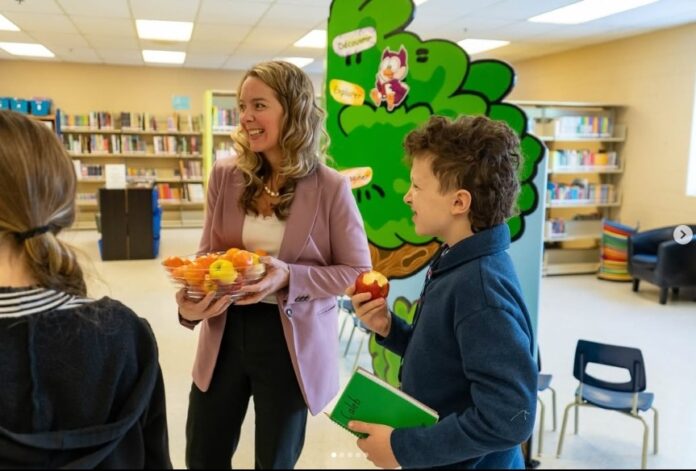
The provincial government announced on Feb. 7 that New Brunswick will be receiving more than $11 million from the federal government to bring more healthy food into schools.
Education and Early Childhood Development Minister Claire Johnson said that bringing more nutritious food into schools was a “big priority” for her team.
“A universal breakfast program is very important because it’s non-stigmatizing,” said Johnson.
Johnson added that estimates say one in three and a half children in New Brunswick face food insecurity, so offering a general program that’s open to everyone gives children the opportunity to freely utilize what’s available to them.
This program was a campaign promise by Premier Susan Holt’s Liberal Party leading up to the 2024 election.
Mike Fleming, the past president of Fredericton Community Kitchens, said that the ability to give students access to a free, nutritious breakfast program is “absolutely critical.”
“Being able to offer a healthy breakfast that’s universal, that’s not tagged with a label … it removes the stigma from having it rely on government-funded programs,” said Fleming. “All the research is clear, hungry students don’t learn well. So it’s absolutely essential.”
The federal funding will be utilized over three years with the goal of having these breakfast programs available to students across the province by the end of the 2026-2027 school year.

According to Johnson, “a lot” of schools across the province closed their cafeterias during the pandemic, forcing them to start building some of these programs from scratch.
The current plan is to begin implementing this program in schools that already have well-organized cafeterias and then begin to roll it out for institutions that need more support.
Fredericton Community Kitchens is a charity that provides nutritious food to anyone who needs it with the hope of eliminating hunger in the city. Fleming acknowledged that there’s been a recent increase in demand.
“You can tell that the depth of poverty is increasing, but also the number of related issues that people are dealing with has increased,” said Fleming.
“There’s a huge increase in absolute demand and many of the people that are coming are in worse shape overall than what they used to be.”
The kitchen reports that it serves over 17,500 meals per month.
Their Student Hunter Program partners with over 20 schools to prepare and provide between 200 and 350 student lunches every day.
Fleming said that it will be “a logistical challenge” for the provincial government to make this program work.
“[It] requires a pretty significant investment in coordinating the food delivery and food preparation, even distributing the food in schools, cleaning up the meals … it’s going to require a lot of coordination, a lot of infrastructure is going to have to be put in place,” said Fleming.
Overall, Johnson said her goal with programs like this is to try to create a welcoming environment for people to want to work in New Brunswick schools.
“We have to make sure that we’re engaging and we’re paying attention to the young adults who are coming into the system to find out what type of work do they want, what type of teams do they want, what kind of environment do they want?”
All of the measurements that were established by the provincial government for the Education Department on Jan. 30 were made with the hope of exceeding them by 2028, according to Johnson.
“We’ve got a pretty good plan as to how to get there, so I’m feeling optimistic about it.”
